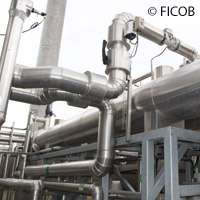Beer brewing comes clean

Behind a simple glass of cold beer lies a quiet industrial revolution promising to take the brewing industry by storm. Although the world's breweries have been recovering CO2 from the brewing process for other industrial uses for almost two decades, the process can consume copious amounts of energy and water.
Enter Union Engineering, an enterprising Danish company that has developed an ingenious and much more environmentally friendly brewing solution called ECO2Brew. Based on advanced CO2 recovery technology, the initiative was launched under the EU project FICOB ('Full-scale implementation of innovative CO2 recovery plant for use in breweries').
The innovative technology enables breweries to effectively capture the CO2 in its fermentation tanks. The recovered CO2 can then be used to make carbonated soft drinks in other beverage lines or factories. ECO2Brew is designed to operate water-free and to use significantly less power - while recovering CO2 at a higher rate than other technologies.
Embarking on a joint venture with Danish brewer Carlsberg, the team at Union introduced the novel technology in 2012.
"We spent the first six to eight months running tests at the CO2 production at Carlsberg," says Union's Chief Sales Officer Michael Mortensen. "The test-phase and the last adjustments were crucial for us prior to launching within the brewing market."
A ECO2Brew plant with an output of 1000 kg/hour saves around 4600 cubic metres of water per year and has energy savings of 20 percent, explains Mortensen.
"This project has offered us the opportunity - with support from the EU's eco-innovation fund - to develop a new and ground-breaking technology for the food and beverage industry, which in certain ways is a mature industry," he says.
In autumn 2012 the first ECO2Brew plant was officially launched at the Carlsberg brewery in Denmark, and both Union and Carlsberg are impressed with the results. Union's subsequent live test results showed that the power and water savings expected were easily achieved.
"We are really, really happy about the plant, but most important is that Carlsberg is happy," says Mortensen. "Carlsberg has just awarded us the second ECO2Brew plant in Finland, which we consider as the real stamp of approval for the project."
For Carlsberg, capturing significantly more CO2 will benefit its onsite soft drinks bottling plant, while cutting costs for energy and water. For society at large, the technology is likely to boost European competitiveness within the industry and create jobs.
"A project like this gives us the opportunity to increase our business and create employment possibilities," says Mortensen.
As more breweries start to show interest in this new technology, Union Engineering's position as a pioneer in green brewing is now established.
"We're unveiling ECO2Brew this year at one of the industry's major global trade exhibitions, Drinktec in Munich, Germany," says Mortensen.
In the meantime, trade magazines are already welcoming the concept in what could soon be a European-led green revolution in brewing.
More information: www.union.dk/HOME/NewBrew
Provided by CORDIS



















